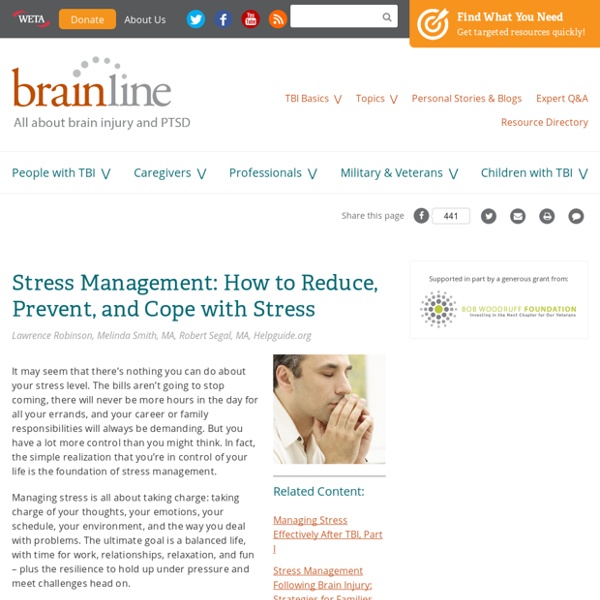Stress Management
What is stress management? It may seem like there’s nothing you can do about stress. The bills won’t stop coming, there will never be more hours in the day, and your work and family responsibilities will always be demanding. But you have a lot more control than you might think. If you’re living with high levels of stress, you’re putting your entire well-being at risk. Stress wreaks havoc on your emotional equilibrium, as well as your overall physical and mental health. Effective stress management helps you break the hold stress has on your life, so you can be happier, healthier, and more productive. Speak to a Licensed Therapist The world's largest therapy service. 100% online. Tip 1: Identify the sources of stress in your life Stress management starts with identifying the sources of stress in your life. Sure, you may know that you're constantly worried about work deadlines, but maybe it's your procrastination, rather than the actual job demands, that is causing the stress. Find balance.
A general overview on how to manage and cope with stress....
The harmful effects of stress at work
During college, students spend about four years stressing over assignments, deadlines and adapting to new environments. As they prepare to enter the workforce, the pressure to meet academic expectations gets replaced with high career expectations and the stress continues. Although a constant state of stress has become the new norm for many working adults, the physical and mental toll is crippling their chances at success, esteemed workplace and happiness experts Annie McKee and Emma Seppälä argue in their research. "Most of us work more than eight hours a day," McKee writes in her latest book "How To Be Happy At Work" based on decades of working with Fortune 500 companies. "That means that if we are unhappy at work, we are miserable from more than a third of our lives." McKee notes that "slow-burning stress, anger and other negative emotions can literally kill us." Why you're probably feeling so stressed at work This is ultimately not a sustainable way to live.
20 Tips to Cope With Stress
Evelyn Boon, Senior Principal Psychologist from the Department of Psychiatry at Singapore General Hospital shares 20 tips to help you better deal with stress. From the elderly to even young children, it seems that everyone deals with stress nowadays. Stress is our body’s (and mind’s) way of telling us that something has upset our normal equilibrium. A good way to start for many people is to eliminate artificial stress reducers, like alcohol or smoking which are detrimental to our health and beauty and only temporarily alleviate our stress symptoms without treating the cause. Eliminating the biggest sources of stress and learning to manage the rest will help you have a positive outlook towards life, which will have a positive trickling effect on your family and friends. Ref: Q15
Stressors are events or conditions that causes stress...
Stress: Signs, Symptoms, Management & Prevention
What is stress? Stress is a normal human reaction that happens to everyone. In fact, the human body is designed to experience stress and react to it. When you experience changes or challenges (stressors), your body produces physical and mental responses. That’s stress. Stress responses help your body adjust to new situations. What happens to the body during stress? The body’s autonomic nervous system controls your heart rate, breathing, vision changes and more. When a person has long-term (chronic) stress, continued activation of the stress response causes wear and tear on the body. Physical symptoms of stress include: Aches and pains.Chest pain or a feeling like your heart is racing.Exhaustion or trouble sleeping.Headaches, dizziness or shaking.High blood pressure.Muscle tension or jaw clenching.Stomach or digestive problems.Trouble having sex.Weak immune system. Stress can lead to emotional and mental symptoms like: How is stress diagnosed? Stress is subjective — not measurable with tests.
A video summary of what stress is and the effects of...
Symptoms of work related stress
Symptoms of work-related stress Work-related stress is a growing problem around the world that affects not only the health and well-being of employees, but also the productivity of organisations. Work-related stress arises where work demands of various types and combinations exceed the person’s capacity and capability to cope. Work-related stress is the second most common compensated illness/injury in Australia, after musculoskeletal disorders. Work-related stress can be caused by various events. In Australian, more than $133.9 million was paid in benefits to workers who had made claims related to workplace stress during the 2004/2005 tax year. What one person may perceive as stressful, however, another may view as challenging. Symptoms of work-related stress The signs or symptoms of work-related stress can be physical, psychological and behavioural. Physical symptoms include: What are the main work-related stressors? Causes of work-related stress Self-help for the individual Where to get help
(c) A physiological response to threatening situation...
Sources of stress comes from money, job pressure, relationships,...
Daily Life - The American Institute of Stress
Since 2007, APA has commissioned an annual nationwide survey as part of its Mind/Body Health campaign to examine the state of stress across the country and understand its impact. The Stress in America™ survey measures attitudes and perceptions of stress among the general public and identifies leading sources of stress, common behaviors used to manage stress, and the impact of stress on our lives. The results of the survey draw attention to the serious physical and emotional implications of stress and the inextricable link between the mind and body. Top sources of stress were the rise in prices of everyday items due to inflation (e.g., gas prices, energy bills, grocery costs, etc.) (cited by 87%), followed by supply chain issues (81%), global uncertainty (81%), Russia’s invasion of Ukraine (80%) and potential retaliation from Russia (e.g., in the form of cyberattacks or nuclear threats) (80%). The sheer magnitude of the COVID-19 crisis is hard to fathom. Key Stress Statistics Sources:
Managing and coping stress in a working environment....



